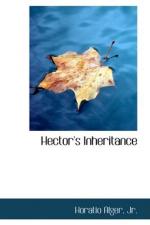“’Baptized, June 17th, Hector, the son of Thomas and Martha Roscoe; a bright, healthy child, in whom the parents much delight.”
“Then it seems to me,” said Hector, “that my case is a very strong one.”
“Unusually so. In fact, it could not be stronger. I marvel how Allan Roscoe, your uncle, could have ventured upon a fraud which could be so easily proved to be such.”
“He depended upon Sacramento being so far away,” said Hector. “He thought I would accept my father’s letter without question.”
“That letter was undoubtedly forged,” said the minister.
“It must have been, but it was very cleverly forged. The handwriting was a very close copy of my father’s.” It was a great pleasure to Hector that he could say “my father” without a moment’s doubt that he was entitled to say so.
“He thought, also, that you would not have the means to come here to investigate for yourself,” said Mr. Richards.
“Yes, and he would have been right but for the commission Mr. Newman gave me. What course would you advise me to take,” asked Hector, a little later, “to substantiate my claim?”
“Get Mrs. Blodgett’s and Rev. Mr. Barnard’s sworn affidavits, and place them in the hands of a reliable lawyer, requesting him to communicate with your uncle.”
This advice seemed to Hector to be wise, and he followed it. Fortunately, he had no difficulty in inducing both parties to accede to his request. The next day he returned to San Francisco.
CHAPTER XXXVII.
A narrow escape.
Armed with the affidavits which were to restore to him the position in life of which his uncle had wickedly deprived him, Hector returned to San Francisco. He found Gregory unaffectedly glad to see him.
“Glad to see you back, Hector,” he said; “I missed you.”
Hector was glad to find that Gregory had not taken advantage of his absence to indulge in any of his old excesses. He began to hope that he had already turned over the new leaf which was so desirable.
“I know what you are thinking of,” said Gregory, after Hector had returned his salutation. “You are wondering whether I ‘cut up’ any while you were gone.”
“You don’t look as if you had,” said Hector, smiling.
“No; I have had enough of sowing wild oats. It doesn’t pay. Shall I tell you what I did last evening?”
“If you like.”
“I attended a lecture illustrated with the stereopticon. I was in bed at ten.”
“Gregory,” said Hector, taking his hand, “you don’t know how glad I am to hear this. I am sure your uncle will be delighted when you return to him so changed.”
“I’ve made a great fool of myself,” said Gregory, candidly. “Hereafter I am going to make you my model.”
Hector blushed deeply, for he was a modest boy.
“You compliment me too much, Gregory,” he said. “Still, if you are in earnest, I will try to set you a good example.”




